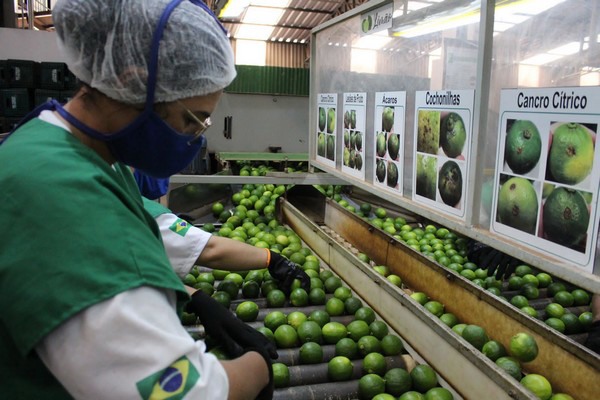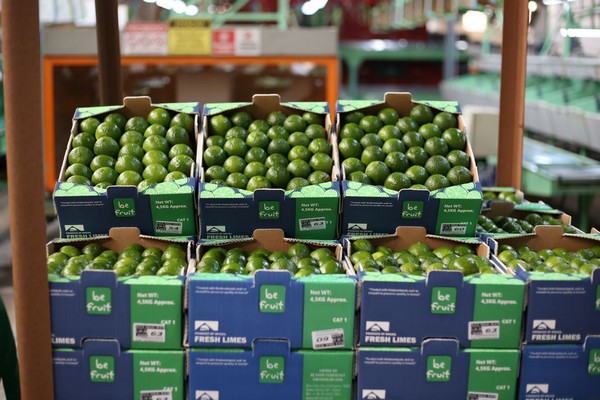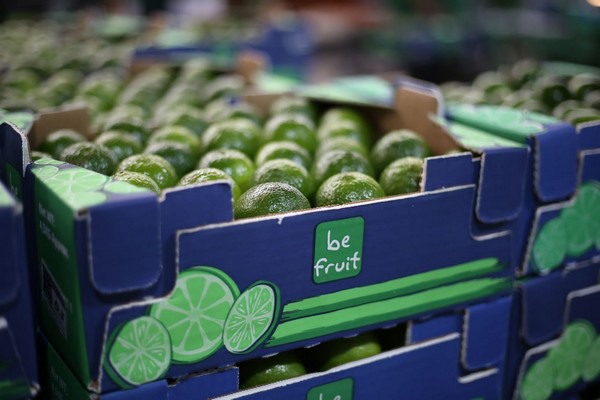Brazil’s Tahiti lime season is winding down slowly with a lower peak seen this year. According to Luiz Eduardo Raffaelli, from the Brazilian exporter Be Fruit: “Last year our season started in early November instead of the usual December. Right now we do not have a lot of volume, we are supposed to be in the peak of the season but the fruit is already finished.” Raffaelli was commenting while attending MacFrut 2023 held in Italy last week.

Although Brazil’s president made recent visits to China, along with a business delegation, the European market is still their biggest fruit export market. About 75% of exported fruit from Brazil is still being exported to Europe and the UK market. This includes table grapes, limes, avocados, litchis, bananas, melons, and papayas.
“We can supply Europe with limes all year round. Because we can prepare the trees for our main limes season from December to June, and also for the off season from June to November. The Mexican season is opposite to ours. They have productions from May until September/ October. We are complementary and don’t fight each other for the market,” says Raffaelli.
Brazil’s planted area for limes increased in recent years, with a resultant increase in volumes that are exported to Europe. “Consumption of limes in Europe is more in summer time and related to food service. During winter consumption is lower. During the pandemic people started realising and using limes for juices etc. The movement of limes is more flat lately,” states Rafealli.

He says limes can be stored for a long period, going from tree to consumer over a good 6-7 weeks in-between. This makes the shelf life of limes ideal for exporting to Europe. However, Brazilian’s have grown tired of European consumers “asking importers too much for dark green lime, from Mexico. “The best lime is the lighter green one, which has more juice and flavour. Normally it has 50% juice, is softer and way better. While it is difficult to change people’s minds they are starting to see and learn the difference. Six or seven years ago the European market has been asking for the Mexican lime, but learned and are now asking for Brazilian limes.”
Raffealli describes what makes the lime dark or light green. “It depends on the age of the tree, when it’s small, it’s more green and dark. Also when it is rainier it makes the darker colour, while when the tree grows bigger it becomes lighter. There are different lime colours and varieties. The main ones are the Brazilian Tahiti and Mexico Persian limes, but in the end it’s almost the same fruit.”
He sells the limes mainly on a fixed price all year round while leaving some space for spot market trading. He is also not worried by other producing countries, other than Mexico, that also grow limes. “Mexico and Brazil grow the most while Spain has a little bit and Morocco, Peru is starting the business and Colombia too.”

Challenges and Brazil expanding to Asia
He says their biggest challenges are the weather, exchange rates and shipping costs. “Asia is a good market, but the problem is the shelf life of the limes due to the long journey. The Brazilian government is working to increase and open those markets for us. It’s not a reality for limes yet, but something we must explore. We just export melons to China, and we use dollars. The Brazil Real is has strengthened against the Euro with more than 10%. Our business split with sending to Italy, Spain, Germany and Holland. I send full containers to every client, I don’t split it for customers. I prefer to send big volumes.”
Raffaelli concludes by saying meeting and keeping the global standards is key for Brazilian producers. “We produce under the law, we respect the laws and produce under all the needed certifications. It is harder to produce in a country with a tropical climate unlike Europe with deep cold winters that keep diseases under control. We have Global Gap and other certifications to ensure we produce to the right standard,” concludes Raffaelli.
For more information:
Luiz Eduardo Raffaelli
Be Fruit
Tel: +55 11 3373 7337
Email: [email protected]
www.befruit.com.br









